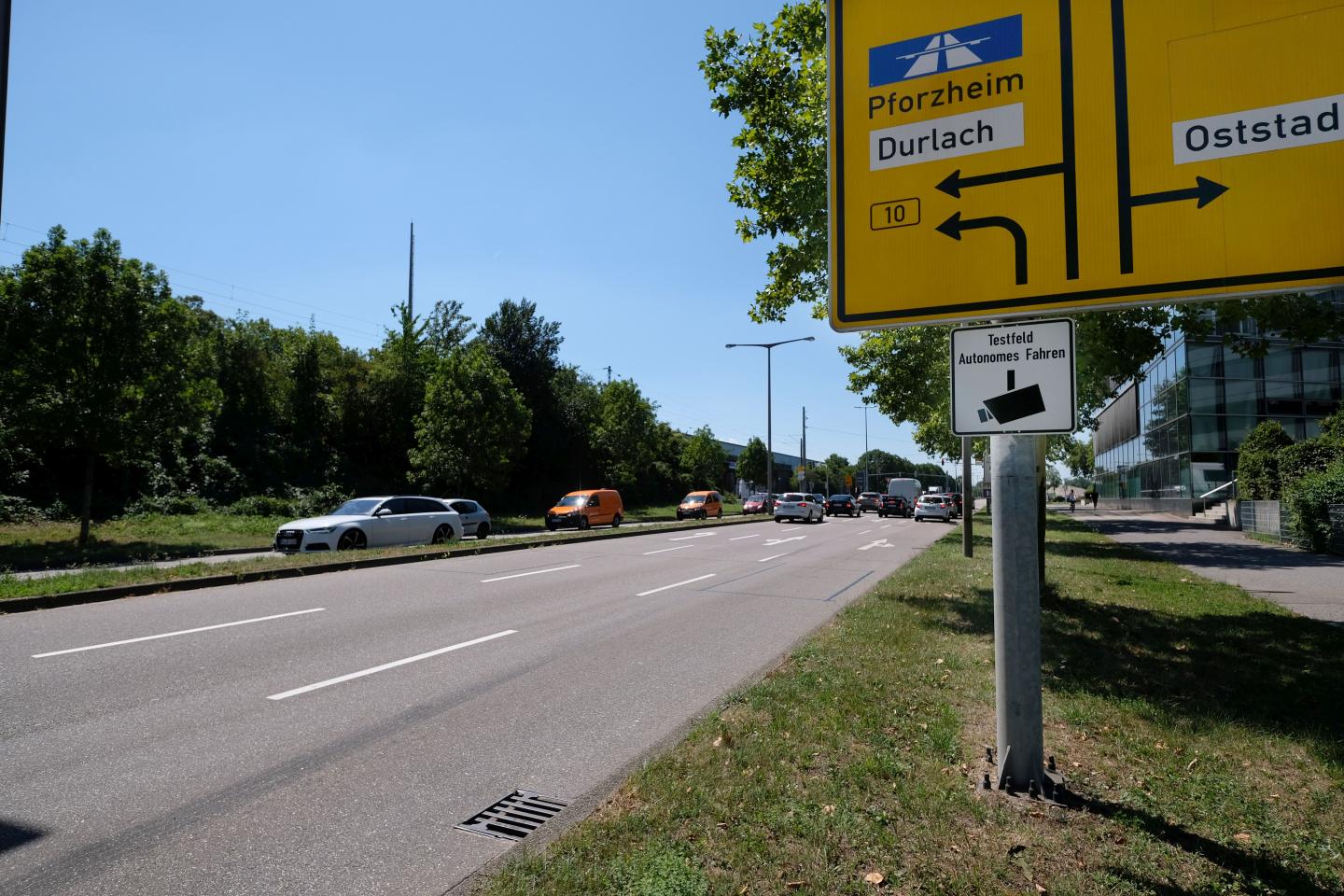Scientists analyze traffic-related, technological, social, and legal impacts — recommendations to politics, society, and industry

Credit: Photo: Manuel Balzer, KIT
On the Baden-Württemberg Test Area for Autonomous Driving, TAF BW for short, research projects carried out under real conditions are to yield valuable findings for the development of automated driving. But how do these projects influence traffic and technologies on the test area? What does the test area that is integrated in real road traffic mean to the society? And which legal problems result? Within the “bwirkt” project, research will focus on impacts of automated and networked driving and recommendations for science, industry, and politics will be derived. Researchers of Karlsruhe Institute of Technology (KIT) will concentrate on the impacts on traffic.
“When the number of autonomous vehicles driving on our roads will increase in future, this will presumably affect the citizens’ traffic behavior and road traffic proper. We have to be able to estimate this impact and to respond to it,” says Dr. Martin Kagerbauer from the Institute for Transport Studies (IfV), who coordinates the project on the part of KIT. “Within the projects executed on the test area, we study the impacts of automated and networked driving on transport demand and traffic flow.” Among others, scientists of IfV want to find out whether automated driving affects the number of drives and the distances covered and whether destinations or the choice of transport means will change. They use the IfV-developed mobiTopp software to simulate passenger transport demand. Using the data measured by the TAF BW sensors for distances between cars, capacity, and time gaps, the team will study impacts on traffic flow. In addition, other measurements will be made on TAF BW.
The coordinator of “bwirkt,” the FZI Research Center for Information Technology, an innovation partner of KIT, develops an evaluation concept for accompanying research. Moreover, FZI will analyze and assess technological, organizational, and data protection aspects of the test area. Professor J. Marius Zöllner, Executive Director of FZI, explains: “We will derive research and development needs from the findings obtained and communicate the recommendations derived for different target groups.” Evaluation of research on the test area will ensure knowledge transfer to politics, industry, and society. FZI, together with the State Agency for New Mobility Solutions and Automotive Baden-Württemberg, e-mobil BW, will organize status seminars with all actors involved in the test area. Like KIT, e-mobil BW is a partner of the project consortium. “Combination of the different competencies of the project partners with the projects executed on the test area enables efficient coordination of autonomous driving research in the state of Baden-Württemberg,” Zöllner says, who also is spokesperson of the test area.
“The State Agency for New Mobility Solutions and Automotive Baden-Württemberg will accompany the TAF BW projects and the projects carried out under the Smart Mobility Program together with our research partners FZI and KIT. In this strong network with our partners from science, industry, and public administration, we will promote one of the central mobility issues of the future. However, technology is not an end in itself. Within bwirkt, we will integrate future users of automated and networked mobility solutions at an early stage,” says Dr. Wolfgang Fischer, Head of the Project and Cluster Activities Division of e-mobil BW GmbH. “The different needs and requirements will be identified in dialog and specific communication formats will be developed for the target groups. We are involved in several work packages of the project and will focus on the impacts on society and public relations in particular.”
###
About the “bwirkt” Project
The project “Begleit- und Wirkungsforschung zum automatisierten und vernetzten Fahren auf dem Testfeld Autonomes Fahren Baden-Württemberg (TAF BW) mit Schwerpunkt auf verkehrlichen Wirkungen” (accompanying research into the impacts of automated and networked driving on the Baden-Württemberg test area for autonomous driving (TAF BW) with a focus on impacts on traffic) – bwirkt for short – has a duration of 36 months and will end on December 31, 2021. The project is funded by the Baden-Württemberg Ministry of Transport with EUR 300,000. FZI coordinates the research project, its partners are KIT and e-mobil BW.
More about the KIT Mobility Systems Center http://www.
Press contact:
Margarete Lehné, Stellvertretende Pressesprecherin, Phone: +49 721 608-21157, Fax: +49 721 608-45681, [email protected]
Being „The Research University in the Helmholtz Association”, KIT creates and imparts knowledge for the society and the environment. It is the objective to make significant contributions to the global challenges in the fields of energy, mobility and information. For this, about 9,300 employees cooperate in a broad range of disciplines in natural sciences, engineering sciences, economics, and the humanities and social sciences. KIT prepares its 25,100 students for responsible tasks in society, industry, and science by offering research-based study programs. Innovation efforts at KIT build a bridge between important scientific findings and their application for the benefit of society, economic prosperity, and the preservation of our natural basis of life.
Media Contact
Monika Landgraf
[email protected]
Original Source
https:/



